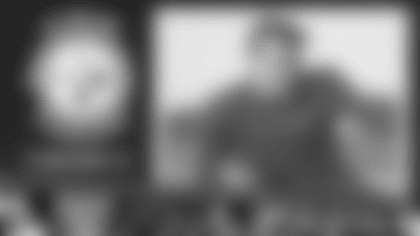The late '60s and early '70s were an era of change in the United States. Segregation had ended. The Cold War was still broiling. The mills – particularly the steel mills in Pittsburgh – that had spurred the nation to victory in World War II were closing up.
And the Steelers were about to become the dominant team in the National Football League.
In 1973, the Steelers were still setting the table for a team that would win an unprecedented four Super Bowls in six seasons. They were coming off their first playoff win, a miraculous victory – some would say Immaculate – over the Oakland Raiders before losing to the unbeaten Miami Dolphins in the AFC Championship.
Less than a month later, the Steelers added a player head coach Chuck Noll believed would be the missing piece to a defense that had held the Raiders and Dolphins to 28 combined points in the postseason by selecting defensive back J.T. Thomas in the first round of the NFL Draft.
"When I came here, Chuck Noll told me, 'We're probably one player from a Super Bowl,'" Thomas said. "I was thinking BS. He's just saying that."
It turned out to be at least partially true, though it would take another year to come to fruition.
The draft at that time was held Jan. 30 and 31 in New York and it didn't have nearly the fanfare it does now, 50 years later. In fact, Thomas, now 71, didn't even know he was selected by the Steelers with the 24th-overall pick until the following day.
The Florida State graduate – the first Black football player to attend Florida State in 1969 and first Black player to graduate from the university – was on a long trip back to Tallahassee, Fla., and completely missed the event.
"I didn't have an agent. There was one agent out of Houston that used to coach at Texas Southern," Thomas said. "He had represented a lot of young players. He had flown me and a couple of my teammates out to Houston to watch the draft.
"I'm not kind of buying it. I go back to Tallahassee. I'm not staying for the draft. It was a long flight. I flew into Jacksonville. I got on a Greyhound bus and I thought the bus would leave Jacksonville and go right to Tallahassee. I didn't know it would hit every town in Florida. It was about a 14 or 15-hour journey. I get back at 4 or 5 o'clock in the morning back in the dorm. I missed the draft. At about 3 o'clock, one of my teammates is pounding on my door, 'Coach wants you T.' I go down and he says, 'Where in the hell have you been?' I tell him the story and he says, 'Listen, get yourself down to the TV station. You're the No. 1 draft pick of the Pittsburgh Steelers.'"
The Steelers hadn't been on Thomas' radar. Nor had being selected in the first round. In those days – when NFL teams threw the ball 20 times per game – defensive backs weren't as valued as they are now.
And Thomas hadn't heard anything from the Steelers in the weeks leading up to the draft.
"I had no idea I was going to the Steelers. I never heard from the Steelers. I had never gotten a letter. I never had a conversation. I never ran a 40 for them or anything," Thomas said. "I thought I would be in Miami, Dallas, maybe Kansas City or Green Bay. I had heard from those teams, received letters and all the marketing things. Who would want to come to Pittsburgh? They hadn't won in 40 years until my senior year in 1972."
Funny thing about that win over the Raiders, the first playoff win in team history, it not only put the Steelers on the map in the NFL and announced the birth of a dynasty. It also lined Thomas' pocket.
Rewind a month from when Thomas was selected by the Steelers. He was in Palo Alto, Calif., to play in the East-West Shrine game. And when the Steelers were hosting the Raiders in their AFC playoff game, Thomas was at a party for the players when he did something out of character. He made a bet for the first time in his life.
"We were watching the game. … Guys were betting on the game. I don't know how to bet. I've never bet in my life. There are about 30 guys on the team, so I get arrogant and say, 'I'm going to take Pittsburgh.' I don't know why," Thomas said. "It was 30 bucks a head. So, it's 900 bucks. Mind you, I only left Tallahassee with $500 in my pocket. This is the end of the week and I'm down to $150."
Needless to say, when Oakland went ahead, 7-6, on a Ken Stabler touchdown run with 1:17 remaining in the game. It looked like Thomas would have to pay up.
"As the game progressed, guys start calling my name, 'T, it's time to pay up.' All of a sudden, I became conscious that I had gotten myself into a pickle. I tried to sneak out, and they said, 'Stop T, don't let him out,'" Thomas said. "They blocked the door. So, I'm sitting in a chair by the door with my head down and people are screaming, 'T, you're going to have to pay up.' I'm going back to my Catholic days. I'm saying Hail Marys. I'm doing my missionary Baptist players, 'Jesus, you're the only God.' I'm praying. All of a sudden, I hear this cry out. They screamed it. I looked up and Franco Harris is going down the sideline.
"I'm standing at the door … You can't go unless you've got the 30 bucks. I got 900 bucks. I hadn't seen 900 bucks in my life. I'm on the plane and I must have counted it 20 times."
All accountable to that improbable 13-7 Steelers' victory.
In his first training camp with the Steelers, Thomas' roommate was the team's first-round draft pick from the previous season … Harris.
Even though Thomas wasn't a member of the Steelers in 1972, Harris wanted Thomas to come to the celebration of the 50th anniversary of the Immaculate Reception last season. He wanted Thomas to recount that story.
"He told me when I told him the story that I owed him half of the money," Thomas said of what Harris told him at the time.
Now, 50 years later, Harris brought it up again.
"He said 'T, why don't you put in $900 at 10 percent for 50 years? And then half of it's mine,'" Thomas said with a laugh. "'You need to bring that to the celebration and tell them the story about how I was instrumental in getting you here.'
"I said, 'Wait a minute, where do you get 10 percent from?' He told me, 'God uses 10 percent, so I can use 10 percent.' He was going spiritual on me. But I was going to tell him at the celebration that in the Old Testament, after 50 years, they have the jubilee. After 50 years, all debt is forgiven. Unfortunately, that didn't happen."
Harris passed away just a couple of days prior to the celebration of the 50-year anniversary of the Immaculate Reception last December.
Thomas, meanwhile, is celebrating some 50-year anniversaries of his own.
Not only did he graduate college and get drafted by the Steelers 50 years ago, he also got married that year.
"I've got a lot of 50s going on here," Thomas said.
As for Noll's feeling that Thomas could be the missing piece for the Steelers, he didn't break into the starting lineup until the following season, replacing John Rowser in the starting lineup in 1974.
But the Steelers were such a stacked roster at that time, only four of the team's 20 picks in the 17-round draft played for the team in 1973. And only Thomas and linebacker Loren Toews were with the team for more than two seasons.
The team's second round pick, defensive back Ken Phares, suffered a career-ending knee injury in rookie camp, while fifth-round selection, guard Dave Reavis, went on to become a longtime starter for the expansion Tampa Bay Buccaneers.
As for Thomas, he spent nine seasons with the Steelers, helping the team win four Super Bowls while intercepting 19 passes before spending his final season in 1982 with the Denver Broncos, where he recorded his 20th, and final, interception.
In 2009, Thomas and Mel Blount were voted the sixth-best cornerback duo in NFL history by NFL.com.
Noll was right about Thomas, though the extraordinary 1974 draft, which brought the Steelers wide receivers Lynn Swann and John Stallworth, center Mike Webster, linebacker Jack Lambert and safety Donnie Shell – all members of the Pro Football Hall of Fame – certainly didn't hurt.
"He wasn't lying. The only change other than in the secondary when we won our first Super Bowl was Jack Lambert," Thomas said. "Jack Lambert got thrown in when Henry Davis cracked his neck. If Henry hadn't cracked his neck, Jack Lambert was playing behind Jack Ham. (Davis) ran a 4.5 40. He was a beast. I didn't see anyone taking his spot, but you see how fate works. I didn't see Lambert beating out Jack Ham.
"That's how things work. And Lambert, he's one of the meanest rattlesnakes you'll ever meet in your life. I would tell people if you're going down a dark alley, take Lambert with you. You'll probably come out. He's a special character."
Davis had made the Pro Bowl after the 1972 season. By 1973 after injuring his neck in the preseason, the Steelers moved Lambert into the starting lineup.
Things happen for a reason.
That's the way Thomas, who has made a post-football career out of being a restaurateur in the Pittsburgh area, sees things.
It was something he learned from Noll.
"He respected you as a man. He realized that was so critical," Thomas said. "Chuck was more concerned with character beyond the game. His talks after a game, he'd lecture on your family or he would talk about life's work. He always looked beyond the game. The game was a stepping stone, a springboard.
"You never looked at it as more than that. Because the money wasn't there. We didn't see the game as a place to have life nurtured and set for us. We looked at the game as a springboard into our life. It was a preparatory process. It was just a moment. The money was job money, it wasn't 'for-real money.' The whole idea was that I can get enough money to get into my life's work. I can leverage what I got into something I can call a career. That was the attitude. Now, a No. 1 draft choice is set for life."
That wasn't the case in the early '70s in the NFL. As Thomas noted, he and many of his teammates on the Steelers' first Super Bowl team in 1974 were just a decade removed from being forced to ride on the back of the bus due to segregation laws.
Noll's coaching and an ownership that treated everyone the same helped change that.
"When I came to Pittsburgh, believe it or not, there was a racial divide on the team," Thomas said. "But it was closed. A lot of it had to do with our winning, the oneness that we had. The unity that we had. We didn't have uniformity, but we had unity.
"When I came here, our team was segregated, really. The only thing we did together was practice and play together. That was it. That changed. That dynamic, what changed that? People say coaching or winning. But there was a huge racial divide in this country. When we came to Pittsburgh, the attitude really wasn't about football per se for a lot of the guys, especially the African-American guys. It was about our manhood. It was, we deserve to be here. It was much more psychologically than just the game. It was an opportunity to say that we belonged and that we're men."















